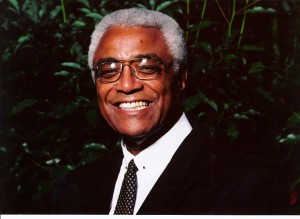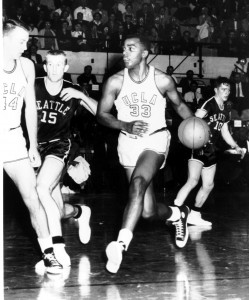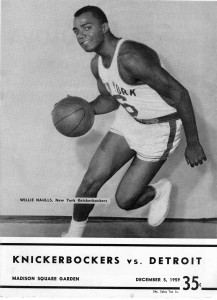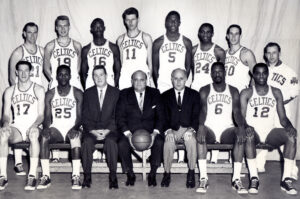By Mark Ellis —
He was an All-American at UCLA and later won three NBA world championships with the Boston Celtics. After his illustrious sports career, he came to understand his mother’s teachings about faith in a whole new way through a fresh encounter with God.
“My mother was an ambassador for Jesus Christ,” says Willie Naulls, the founder of Willie Naulls Ministries, a Christ-centered mission promoting a balanced awareness of academic, physical, and spiritual achievement. Naulls spent the early part of his childhood on the wrong side of the tracks in Dallas, Texas at a time when segregation still held its grip on the city. “It was very oppressive,” he recalls.

Despite the harsh racial atmosphere, his mother’s strong faith encouraged him to see his uniqueness as a child of God. “I was taught not to hate the people who hated me because of the color of my skin, but to pray for them and God would work it out.”
A work ethic that included careful preparation for any assignment and discipline in-the-task was encouraged. “She taught me that nothing is worth having unless you work for it,” he notes. “She was totally against welfare unless people couldn’t work.” As a result, seven-year-old Naulls got his first job delivering ice blocks in the days when many homes still had iceboxes rather than electric refrigerators.
He was large for his age, but his boss overestimated the boy’s strength by allowing him to haul a 50-pound block on his back. As a horrified woman watched in her kitchen, Willie’s knees buckled at an inopportune moment, which sent the ice careening across her linoleum floor. The resulting crash took out a wood burning heater in a cloud of soot. His feet never moved so fast as the panicked youngster raced home.
Naulls provides a colorful account of this incident in his book, “Levitation’s View: Lessons Voiced from an Extraordinary Journey.”
On Saturdays, work took priority over playtime. “We had to shine our own shoes, iron our own clothes, and fold them up before we could go out to play.” It was part of the weekly ritual to prepare for the Baptist church on Sunday morning and school the following day.
When he was nine, the family moved to Los Angeles and settled in a government housing project filled with shipyard workers in San Pedro. This “re-integrated” melting pot provided emotional breathing room for Naulls to form his identity. “Within a few months, my life’s course and destiny were shifted from oppression and the influence of people not wishing me well to that of people who let me be me.”
“I know there was still racism in San Pedro, but they didn’t drive around at night looking for a nigger to lynch,” he says.
Naulls felt distanced from his father, which only got worse after the elder Naulls accused his wife of unfaithfulness during the time he was away from home serving in World War II. One night 12-year-old Naulls awakened to screams by his mother. When he raced out of his bedroom, he witnessed his father pounding his mother with both fists.
Dad saw the children’s faces, barked at them in a menacing fashion, and they retreated to their room. Later young Naulls was haunted by his inaction. “Why didn’t I give my life to protect mom from him?” he wondered. “How can I ever forgive myself? I’ll get even one of these days,” he told himself.
Alarmed neighbors called police, and Willie watched as two officers hauled his father to jail. It was the kind of scene that would leave its imprint for many years. Eventually his parents found reconciliation and forgiveness in Christ and their marriage survived.
A rising star
The first sign of his athletic ability emerged at age 11 in dodge ball. Then he became an all-city baseball pitcher for San Pedro High School. During high school, he thought football was his best sport.

But a basketball scholarship to UCLA – and the influence of legendary coach John Wooden — changed his athletic path and the course of his life. “A lot of Coach Wooden’s one-liners were ones I had heard from my mother,” he notes.
“‘It’s what you learn after you think you know it all that counts…Do your best… Compete against yourself alone…Nothing is worth having unless you work for it,” – in these maxims Naulls heard the echoes of his mother coming from the Wizard of Westwood, the much-lauded coach who eventually won 10 NCAA championships over a 12-year period.
Naulls captained his team at UCLA, became its most valuable player, and then earned an All-American selection in 1956. As his college athletic career soared, his spiritual life sputtered at low altitude.
“At UCLA, I never went to church,” he admits, even as he assumed he was a Christian because of his mother’s influence.
After college, Naulls played for the New York Knicks in six-plus stand-out seasons. He earned four NBA All-Star berths and became the first African-American team captain in the history of integrated professional sports. Bill Russell, who played center for the Boston Celtics, spoke up on Naulls’ behalf, and urged him to come over and play for the Celtics.

“Russell is a great friend and a pioneer,” Naulls says. “Before Russell, the pressure from the organizations and the owners was to play below the rim,” he notes. “Dunking was considered showing the other guy up.”
Many of the friends Naulls grew up with from the ghetto were taught that if they dunked the ball they wouldn’t play. Even Coach Wooden described dunking as “showboating,” according to Naulls.
Barriers overcome
Naulls believes there was also a racist element behind the no-dunk rules. “They were afraid African-American players would dominate the game and take over,” he says. “There was a quota system on each team that allowed only one or two African-American players.”
Coach Red Auerbach at Boston shattered the quota when he played the first all-Black starting team in NBA History during the 1964-65 season. “Auerbach just wanted to win,” Naulls says. “He would have played an orangutan if he thought he could win the championship.”

Naulls recalls a noticeable hush in the crowd when the Celtics’ all-Black team came out on the court for the first time against the L.A. Lakers.
“Auerbach was a benevolent dictator and a great psychologist,” Naulls says. “A lot of people considered him obnoxious, but they were mostly on losing teams.”
During one practice with the Celtics, Naulls remembers Sam Jones complaining because the whole team was working hard on the court with one notable exception. Bill Russell sat in the stands reading the sports page.
Auerbach noticed Jones’ attitude and called a time-out. “All you guys come over here,” he said. “I want you to get one thing straight. There’s one set of rules for you guys, and there’s one set of rules for Bill Russell.”
Everyone laughed except Sam Jones. “Russell was an incredible athlete. He played the full 48-minutes every game.”
After his professional basketball career ended, Naulls went into business in Beverly Hills and followed the same upward trajectory that brought him great success in the sports world.
New spiritual eyes
One day Rosey Grier, the former L.A. Rams football player – soon to be ordained as a Christian minister — invited Naulls to lunch. “You should go to church with me,” Grier chided his friend. (A few years later, Grier served as a bodyguard during Robert Kennedy’s 1968 presidential campaign, and held Kennedy’s assassin on the ground following the tragic shooting.)
“I don’t want to go,” Naulls replied. “I’m a good person…people who go to church are not very upwardly mobile.” Naulls was disappointed that preparation for college was not stressed in the churches he attended in his youth. The segregated Sunday experience, with what he considered hypocritical people left bad memories.
Grier nodded his head slightly. He knew where Naulls was coming from.
“I can’t believe anything I can’t see,” Naulls added.
“That’s your biggest problem,” Grier told him plainly.
“What do you mean?
“Seeing is not believing,” Grier replied. “You have to believe to see.”
The words lingered in Naulls’ mind, because he was forced to consider a new challenge– to consider something beyond the physical limits imposed by his own mind in order to embrace the spiritual realm.
He went to church with Grier on Easter, 1983 at the Crenshaw Christian Center in Los Angeles and heard Dr. Fred Price preach for the first time.
Attracted and intrigued by what he saw and heard, Naulls went back. This time he took three of his four children with him.
At the end of Dr. Price’s message about faith, an invitation was given and the children stood up first. Then God grabbed Naulls’ heart and he stood. They made their way to a prayer room and Naulls began to talk with a counselor.
“Do you want to receive Jesus as your Savior and Lord?” the counselor asked.
“I’ve always believed in Jesus,” Naulls said.
“Believing is not in the mind, it’s in the heart,” the man replied. “Do you believe in your heart?
Naulls pondered the question and didn’t reply immediately.
“Have you confessed Him as Lord?” the counselor added.
As Naulls considered the challenge, the eyes of his heart began to open. For the first time, Naulls owned his faith. It was no longer his mother’s faith or anyone else’s faith. He believed in Jesus at the core of his innermost being and was born-again.
Now he wonders why this simple, straightforward message eluded him. “I attended churches where there were emotional sermons, normally on thematic topics, but they never got down to the basics of asking people, ‘Do you believe in your heart and then confess with your mouth?’”
After his all-consuming focus on sports and business, Naulls started to devour God’s Word with laser-like intensity. He also began to attend Bible studies regularly.
“By the grace of God I wasn’t killed before I made the conscious confession of Christ,” he says. “I had walked in the words of the Lord without committing to the exclusivity of Him. When you do that, you have the option to deviate and go off and sin.”
Change of plans
In the course of his business career, Naulls owned an auto dealership, had built homes as a general contractor, and was a contract negotiator for professional athletes. He was the exclusive negotiator for Adidas during the Olympic games. His wife, a medical doctor, had given up her practice to raise their children and they lived in a beautiful home a few blocks from UCLA.
He and a group of investors were getting ready to buy several more auto dealerships in a multi-million dollar transaction when God derailed his self-made plans. Naulls was cruising down the 405 Freeway when he received a message like no other.
It was as if God spoke directly to his heart. “Get out of business. Better prepare yourself to minister My Word. Tell people what great things I have done in your life.”
Naulls almost drove off the freeway. “I was skeptical of people who said they talked to God or heard from God,” he notes. “I thought they were trying to demonstrate they were more spiritual than I. I never believed them.”
While his business partner laughed and suggested he ate some bad Mexican food, Naulls’ wife took the message seriously. “We know it’s God, so you better do what He tells you,” she said. Within six months, he was out of the business world.
Naulls attended Fuller Seminary, then served as an associate pastor at Antelope Valley Christian Center and director of college ministries at Brentwood Presbyterian Church. Pastor Jack Hayford became an important spiritual mentor.
He started Willie Naulls Ministries, a Christ-centered ministry that inspires young people by teaching hope and promoting a balanced awareness of the importance of academic, physical, and spiritual achievement. Naulls has also written five books that chronicle his spiritual journey and publishes a weekly newsletter.
“I covet to be a pastor of a church again, because people are in such dire straits,” he says. “I was the oldest guy in seminary, but chronological age means nothing in God’s kingdom.”
If you want to know God personally, go here




Comments are closed.